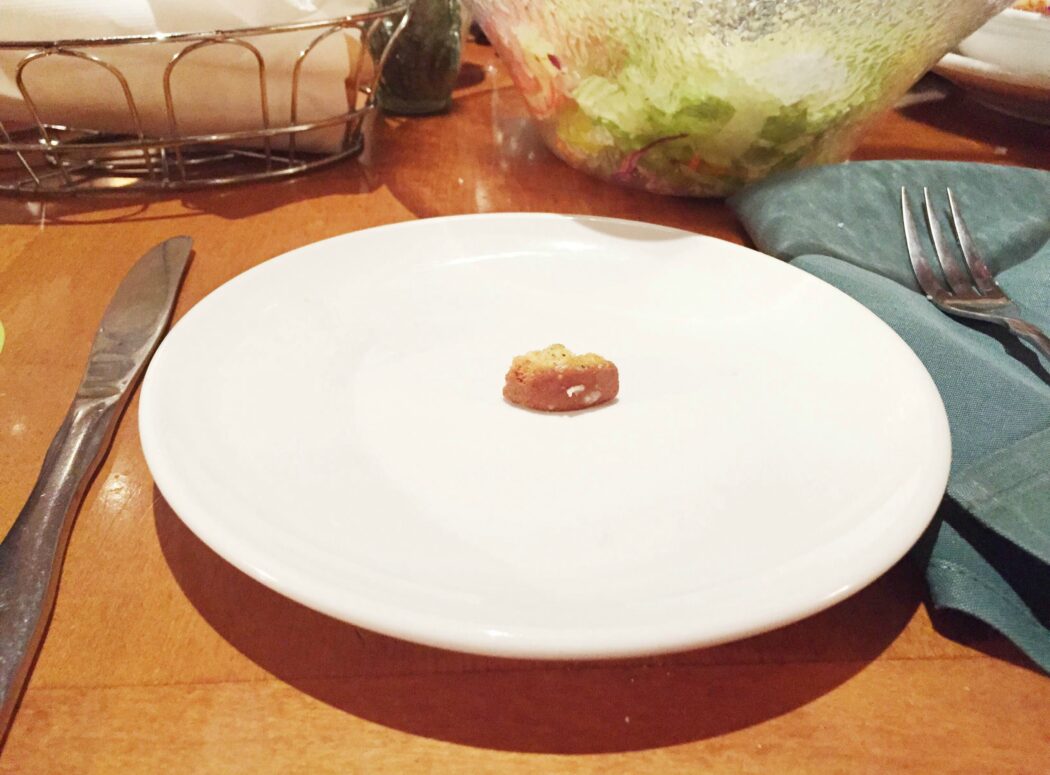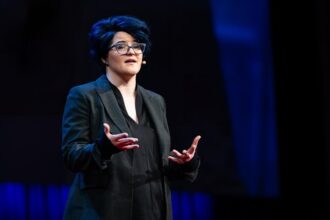No matter one’s age, gender, race or lifestyle, everyone has days where they look in the mirror and are startled by their reflection.
Whether it’s a “Damn, what happened last night?” reaction, or a “Wow, I need to run 10 miles” accompanied by “I feel more bloated than ever,” kind of day, we all experience the occasional mini battle with our body.
For some though, these mini battles aren’t so small. These mini battles have the potential to grow into full-out war.
According to the National Association of Anorexia Nervosa and Associated Disorders (ANAD), up to 24 million people of all ages and genders suffer from an eating disorder. Although it’s an issue for men and women, 85 percent of these sufferers are women.
Regardless of these startling statistics, only one in 10 people receive treatment. It’s difficult for people to recognize when diet and exercise have gone too far.
That’s exactly how it started for senior energy business and finance major Jaimee Baker.
Her freshman year, Baker said she gained the notorious ‘freshman 15’ and was unable to wear clothes she used to. She swapped her closet for baggy sweatshirts.
“I gained the weight pretty fast,” she says. “When I came (to Penn State) I started around 118 pounds from playing sports and having muscle in high school. By Christmas, I was at 135 pounds, which was the most I ever weighed in my entire life.”
With her mother’s help, Baker attempted to change her habits over Christmas break. She was able to get her weight down to 122 pounds.
“It was better than I was, but still not enough,” she says.
Through the remainder of the year and all summer, Baker said her weight hardly changed. With summer ending and a new semester ahead, she was ready to take on sophomore year utilizing her new apartment’s kitchen and cooking Pinterest-found ‘healthy’ meals. She admits she was misinformed on nutrition at the time, not fully understanding concepts such as proper caloric intake or the need for protein.
“People talk about how Americans eat too much, so I told myself ‘I’m just going to eat less and still be healthy,” she says. “If other people do it, I can do it.”
Baker created meals mostly of vegetables and consumed around 1,200 calories a day. According to the Dietary Guidelines for Americans, women ages 19 to 30 require 1,800 to 2,400 calories a day (depending on their activity level).
“I started losing weight and I was really happy,” she says. “I wasn’t working out and was eating whatever I wanted (under her calorie limit), like getting ice cream with my friends. I thought I had figured out the secret no one else had.”
When Christmas rolled around again, Baker was 112 pounds.
“It was less than I weighed in high school,” she says. “I could wear all my tight-fitting clothes again and was really comfortable, but it wasn’t enough.”
At this point, Baker says she was able to skip meals. She said she didn’t consider to be starving herself, she just wasn’t hungry. And when she was hungry, she only had to wait a short time before it passed. When she did eat, she only took a few bites before stopping.
Baker experienced the first repercussions of her habits after a trip to West Virginia University and a weekend filled with “a lot of drinking, not a lot of sleeping, and not a lot of eating.” On the MegaBus ride home, Baker felt extremely sick.
“I thought it was just a hangover or something and that I’d be fine,” she says. “But the week after that, I felt really sick the entire time. It got to the point where I would wake up in the morning and I couldn’t stand up straight because I was so weak.”
Baker told her mom of the symptoms and the two agreed it was probably “just a stomach bug.” Bread supposedly absorbs excess acid in the stomach, so in attempts to rid herself of the sick feeling, she made toast every day.
It took her 45 minutes to finish the toast each time.
“I was trying (to eat) and I wanted to, but I just didn’t feel good and had no appetite,” she says. “It’s something that’s really hard to comprehend if it’s never happened to you before. It was just really difficult.”
Baker continued attending class and walking Penn State’s campus, feeling sick. She decided her remedy may be a weekend home, so she took a few days away from State College. Still, Baker could barely stand up, move fast or consume food. Nothing about her pale appearance seemed healthy, and she wore sweatpants and a t-shirt that would “fit normally now, but was drowning in them” at the time. Her family took her to an UrgentCare walk-in clinic, but were instructed to go to the emergency room.
She weighed only 105 pounds.
“The doctor asked me a bunch of questions, and I never lied,” she says. “I never lied about not eating, I just never told anyone I could skip a meal and be fine.”
The doctor told Baker that her stomach had shrunk to the size of a plum. She was only consuming between 400 and 800 calories a day, and her body resorted to feeding off of her muscle. The doctor suspected an eating disorder. This was the first time ‘anorexia’ was directed at Baker, and she was not happy about it.
“I thought, ‘What are you talking about, I’m just trying to eat healthy.’ I eat when I’m hungry and I eat until I’m full and I’m losing weight,” she says. “Everything was fine.”
The doctor said Baker could only recover by eating. So, she and her family purchased Ensure Nutrition Shakes to begin her body’s road to recovery. It would take her over an hour to finish one 8 oz. drink.
The following day, Baker felt nauseous after finishing an Ensure. She vomited blood and had to immediately return to the hospital, where tests were run and she was given fluids and morphine.
“It was scary,” she says.
Baker had to explain her journey to a new doctor and received the same diagnosis: anorexia.
“At this point, I was still in denial about having an eating disorder,” she says. “My mom and I said it was just kind of an accident, not an eating disorder. I accidently made this happen. That’s how we justified it, I was under the impression that someone who is anorexic is very conscious of it,” she says. “I thought they were doing it on purpose and I wasn’t ready to admit that what I was doing was its own form of anorexia.”
Baker was prescribed a week at home before returning to Penn State because she was unable to take care of herself. Her parents encouraged her to eat although it was extremely difficult.
“The hardest thing I’ve ever had to do in my entire life is eat a piece of chicken that was smaller than the size of my palm,” she says. “It took me hours, but I did it.”
Upon returning to State College, Baker’s mom booked a room at the Hampton Inn and helped her daughter recover for a few days. She drove her to class, made sure she ate, and requested she stay with her. When a few days ended, Baker’s mom assured her that her family would keep in touch at all times, and confidently told her “you can do this.”
And she did.
“I got through it,” she says. “I got through the rest of the semester.”
However, Baker’s recovery wasn’t a simple flip of a switch. She was finally admitting to having an eating disorder, but her recognizing didn’t make it disappear. She went through phases of eating, regaining a few pounds, feeling fat and cutting back once again. There were times when she withered down to a worrisome weight and had to revisit hospitals.
“This went on for an entire year,” she said.
On top of her body constantly changing, Baker’s mental health took a beating. She was depressed and suffering from anxiety, two common side effects of malnutrition. She saw a therapist, a nutritionist and counted her calories. Eating, and the thought of eating, consumed her life.
But there’s always a light at the end of a dark, dark tunnel.
After another weekend at home, Baker asked her parents to drive her to Penn State because she was not feeling well enough to do it herself. She said at that moment, she realized she no longer wanted to be dependent on anyone else.
“I no longer wanted to be seen as the weak person who depended on everyone else and caused myself all this stress all the time,” she says.
And she was. Today, Baker happily shares she is doing well. She now eats regularly and recognizes that health is the most important thing.
“It doesn’t really matter what you look like. As long as you’re healthy you can be happy,” she says.
Baker advises anyone who is struggling with weight and body image to get help and be informed.
“I think that a lot of girls think that they’re dieting and that it’s okay, but it’s usually in a really unhealthy way,” she said. “So whether it’s through a nutritionist or therapist, it’s important to talk to someone and understand the ways you’re hurting your body.”
Baker said she made the decision to get healthy purely from being tired of feeling sick and worrying about permanent damage. She said her health outweighed the desire to be super skinny, although it didn’t come easy.
“Unfortunately,” she says. “No one can help you but yourself.”
Photo by Meghan Tranauskas


